
Pages in this Folder:

Related Folders:
See also Department Site Map
Publications:
Market-related videos
Comments?
For the basics, see
- Website & Privacy Policies
- How To Get Involved
- The Role of the Park
Search options:
Department Site Map
Custodians:
 Food News 2004
Food News 2004
Quick Page Table of Contents
Scanning...
Food News 2004
posted November 21, 2004
Press Release: Ecological Farmers Association of Ontario
Ecological Farmers Association of Ontario, November 8, 2004: EFAO Requests Quota Exemption for Small-Scale, Direct Marketed Chicken.
Ecological Farmers Association of Ontario
FOR IMMEDIATE RELEASE
November 8, 2004EFAO Requests Quota Exemption for Small-Scale, Direct Marketed Chicken
At its annual meeting on November 6 in Listowel, the members of the ecological Farmers Association of Ontario (EFAO) agreed to encourage the Chicken Farmers of Ontario (CFO), and the government, to find a way to create a quota exemption to allow farmers to raise up to 2000 chickens per year, as long as the chickens are sold direct to consumers from the farm or at a farmers¹ market stall. Read More (pdf)>>
posted on November 18, 2004
Unsustainable Fishing Has A Price
Unsustainable Fishing Has A Price
Published: November 17, 2004
CNews (Canoe.ca)In spite of recent scares about BSE and avian flu, those of us living in developed countries have it pretty easy when it comes to meat. Most of us never have to think about where it comes from or how it gets into those sparkling clean shrink-wrapped packages in the store coolers.
But all of our food choices have consequences, especially meat - which includes fish. And a new report published in the journal Science shows just how connected those choices are to nature and even to people in far away lands. Read More (pdf) >>
posted on November 15, 2004
Fallen Fruit
Not sure if you would have seen this, but I thought that you and maybe other market fans might find the article an interesting read. In case you don't know him, Monbiot is a highly respected journalist in the uk who writes on a wide range of progressive ideas. This piece first appeared in the Guardian.
Cheers,
Stephen Targett (from your mailing list...)
by George www.monbiot.com
see www.monbiot.com/archives/2004/10/30/fallen-fruit/
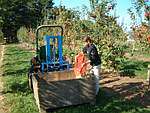
An insane European ruling will be the final straw for the English apple By George Monbiot. Published in the Guardian 30th October 2004.
It takes a while to work out what it is about Hogg and Bull's Herefordshire
Pomona. What it is that, two or three minutes after you've started lifting
the heavy pages, makes you, quite unexpectedly, want to cry. It's not, or
not only, the pictures. The apples and pears painted by a Miss Alice Ellis
can almost be rolled off the page and bitten. She added nothing, took
nothing away. Where she saw warts, she painted warts, where scabs, scabs.
And yet they glow. They are more real than - than any real apple you'll find
in the shops today.
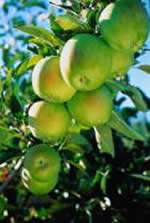
It's not, or not only, the text. It's a classic of late Victorian natural history, pedantic and passionate. Here, among quotes from Shakespeare and Homer and Clare, are recipes for orchard manure, dissertations on specific gravity, the cordon-system of growing pears, Roman cooking, the "laws of Vegetable Physiology", pests, fermentation, soil, grafting. There are chapters on the lives and times of the great fruit growers, transcripts of folk songs and poems, no end of nonsense about the druids and the ancient Britons, unlikely claims about the longevity of habitual cider drinkers. Then you see it. It's the names. The names of the fallen. Foxwhelp, Sheep's Snout, Hogshead, Duck's Bill, Black Wilding, Brown Cockle, Ramping Taurus, Monstrous Pippin, Burr Knot, Broadtail, Carrion, Hagloe Crab, Eggleton Styre, Norfolk Beefing, Cornish Aromatic, Skyrme's Kernel, Peasgood's Nonesuch, Tom Putt, Bitter-scale, Slack-my-girdle, Bastard Rough Coat, Bloody Turk. The list runs into thousands. It is a history of rural England, a poem in pomology, rough and bitter and sad.
Sprouting from every name is a tree of knowledge. Before I read this book, I am ashamed to say, I thought that an apple was something you picked and ate, sometime around October. Now I know that the best dessert apples are those which must be stored for a month or more. There are some which aren't ready to come off the tree until December; others which are unfit to eat unless they've been in the cellar from October till March. There is one variety, the Winter Greening (Shakespeare's Apple John), which can be kept for two years. There are apples which taste of aniseed, banana, pineapple, nutmeg and carraway. There are apples grown for roasting over the fire, so that they burst and turn into "lamb's wool", the flavouring for a winter drink. There are others bred to be broiled in a pan. There are hundreds which cannot be eaten in any state, but are grown for making cider. Some are the size of walnuts: the smaller they are, Hogg and Bull contend, the better the cider.
posted on November 14, 2004
Book Review: Eat This Now
THE FRANKENFOOD MYTH: HOW PROTEST AND POLITICS THREATEN THE BIOTECH REVOLUTION
BY HENRY I. MILLER AND GREGORY CONKO
PRAEGER PUBLISHERS, 296 PAGES, $39.95
The New York Post On-line editionHENRY I. Miller and Gregory Conko are true believers in the power of biotechnology in agriculture to improve life as it generates bounteous profits for innovative companies with the vision to invent and develop "superior" genetically modified (GM) plants. The fly in their ointment is overly zealous government regulation stimulated by vocal and paranoid bio-skeptic activists whose alarmism impedes biotech companies from feeding a hungry world.
They make many valid points. It is indeed a crime against humanity that some African leaders, egged on by radical European Greens, decided to let their people starve rather than distribute corn they deemed "toxic" because it had minor genetic modifications. But if the authors hoped to convince the masses that so-called "Frankenfoods" are as safe as crops that have been modified through natural cross-breeding techniques, their book doesn't quite make the grade. Read More (pdf) >>
posted on October 30, 2004
Going Organic Is It Worth It?
Going Organic Is It Worth It?
By JUDITH WOODS
Published: October 30, 2004
The Daily TelegraphLONDON, England - Looking back, it was the porcini that finally tipped me over the edge. While out shopping for a midweek supper treat, I was reaching for the organic porcini mushrooms when my inner voice of reason cut in.
Hang on a minute: Porcini are uncultivated and gathered from the wild. How on earth can one pack be more organic than the other? And how come the "organic" version is a whopping (ps)37 per kilo more expensive? Read more >>
posted on October 12, 2004
Majority uneasy about GM food
Canadians cool to altered crops
Majority uneasy about GM food
By PETER CALAMAI Science Writer
Published October 11, 2004
The Toronto Star Online EditionOTTAWA—Unease over genetically modified food continues to rise among Canadians with three out of five saying such foods provide more risks than benefits, according to a recently released federal government poll.
This concern translated into a majority (53 per cent) of adult Canadians telling pollsters working for Ottawa that they were uncomfortable buying foods with genetically modified ingredients. Only 31 per cent gave the same answer in the first such survey five years ago.
posted September 20, 2004
Monsanto ripped over wheat experiments
From Canoe.ca (Thanks to Wallie Seto for forwarding this)
Monsanto ripped over wheat experiments
By COLIN PERKELTORONTO (CP) -- Field trials of genetically modified wheat are still being conducted in Canada by multinational biotech giant Monsanto despite a pledge earlier this year that the testing would be abandoned, critics said Tuesday.
In a letter to Greenpeace Canada late last month, the Canadian Food Inspection Agency confirmed that 16 Monsanto trials of so-called Roundup Ready wheat are continuing "to allow researchers to complete their research."
Greenpeace, one of several environmental groups opposed to the trials, said Monsanto should have torn up the fields as it said it would.
"The trials are a danger for both the environment and for the potential for release for farmers," said Pat Venditti, genetic engineering campaigner for Greenpeace.
"It could pose a serious threat to Canada's ability to export wheat crops."
Monsanto did not immediately return phone calls Tuesday.
Genetically modifying crops involves manipulating their genetic material to produce special characteristics. In May, Monsanto declared it would "discontinue breeding and field-level research" into wheat resistant to the popular herbicide Roundup.
Many export markets, Japan and the European Union among them, have warned they would stop buying wheat from Canada if any of it is genetically modified.
Monsanto's decision followed a campaign by critics who argue that little is known about the impact of genetically altered crops on the environment or human health.
Also, a government report in January suggested farmers would need to use more pesticides if the wheat were to be widely cultivated.
Monsanto also withdrew requests to Ottawa to allow unconfined environmental release of the crop and assessments of the wheat's safety for animals and people.
While Ottawa insists it has tough rules to isolate the fields, critics maintain there are no guarantees contamination of other fields won't occur.
"It is worrisome they would be doing this," said Marc Loiselle with the Organic Agriculture Protection Fund from Hague, Sask.
"The understanding was that all trials were to be abandoned and . . . existing test plots would be destroyed."
Citing concerns about vandalism, the federal government refused to disclose the locations of the 16 plots.
The secrecy is another problem, said Venditti.
"If you are a farmer or producer half a mile or 100 yards from a genetically engineered wheat trial, you have no way of knowing if what's growing next door is genetically engineered," Venditti said.
"We don't think there should be any field trials of this crop . . . particularly if it's not going to be commercialized."
posted September 9, 2004
Corsican Food
From the Editor
Deirdre Newman, a good friend of the market who lives part of every year in Corsica, sent this e-mail:
"You might be interested in the following group: ssociation.capvert@wanadoo.fr This is our local, organic group, Les jardins traditionnels du Cap-Corse. What is so sweet is that the normal, lowest level of food quality here is so high in comparison with what we have in Canada. The level of health here is VERY high."
The closest to a website we got was this group.
It sounds like another version of the slowfood efforts to re-join food to culture.
posted June 7, 2004
Can we count on our food supply?
Harriet Friedmann, The Globe and Mail
Can we count on our food supply?
By HARRIET FRIEDMANN
Published: June 7, 2004
The Globe and MailLester Brown of the Worldwatch Institute has once again warned of looming food scarcity: Measured against consumption, there's just 59 days' worth of grain, according to some reports. "The chances of farmers digging their way out of this hole are less than one in 10," he says.
This has been a refrain of environmentalists since the 1972 warning by Club of Rome scientists that finite resources in a growing world will lead to collapse. Does the recent series of poor harvests mean impending disaster?
posted May 15, 2004
Discussion of industry practices - Loblaws
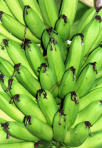
Dear organic farmers,
Yesterday I did the shopping for my ailing in-laws at the Loblaws around the corner from them and found that
1. all the iceberg lettuce in the store is certified organic
2. you have a choice of organic or non-organic bananas, both at 79 cents a pound, only that the organic ones looked better.
Can you give me a hint about the economics of that industry? Doesn't make sense to me.
-Jutta-
Reply from Lorenz Eppinger (of Greenfields Farm):
Loblaws are the absolute king at organic bananas when it comes to price - organic iceberg lettuce is available in abundance right now, just name a price you are willing to pay and they will give it to you. However, most organic consumers are aware of the low nutritional value of iceberg lettuce and it's relatively high probability of contamination, hence it isn't moving too well.
Reply from Alvaro Venturelli, who sells at our market:
Loblaws has been trucking through Ippolito trucking, not the produce outlet at the Food Terminal. They were bringing in seven full trucks a week just of organic produce. They also have a huge buying power as they are the larget supplier of Organic Food to Canada. This means bulk buying power. As well, these stores are famous for operating on the concept of loss leaders. As long as they bring them in, they don't mind losing money, and produce is the number one loss leader due to its perishable nature. Also, on my trip through Mexico, I ran into many organic farming situations where the farmers were stuck with many tons of produce. One farm alone left over 100 tonnes of mangoes on the trees. There is not a distribution system set up to get so much organic food out. The large distributors would rather sell less food at a higher profit margin. This leaves large buyers in the position of picking and choosing who they'll buy from, as well as in as position to demand certain prices from the farmers. Why would they build more infrastructure to bring in more food, at a lower profit margin? They wouldn't. Also these bananas though they're from Ecuador, are probably from a US owned corporation. This past year, the US gave out more than $28 Billion in Agriculture subsidies, mainly aimed at export surplus, to throw food at other countries, in the interest of establishing preferrence for their buyers, and also to kill off local competition from local farmers by dumping on their seasonal markets. We do not have any remotely comparable subsidy here and yet our distributors prefer US goods because of the price difference they can offer. They can sell it for less than it cost to produce. Pretty nasty. The Romans did it,and the Egyptians before them. It's a tool of imperial domination via the creation of trade imbalances.
A generally accepted premise from those in food security fields is the idea of building local food webs. Know your farmer. Truthfully, you are the answer. Direct farmers markets are a huge step in the right direction. The US has done this a while ago in the interests of stronger local food systems. Its protectionism which comes not in a form of subsidy but just the elimination of foreign competition. Europe does it, the US does it and for some reason, our government has not. This is done by only allowing local farmers to sell food at our venues.Those of us in the true north strong have a bit of a disadvantage here but it doesn't exclude us from making good connections directly with southern farmers, or not allowing them to dump on us and kill our seasonal markets. Basically, the delivery mechanism is in the wrong hands;. The truth is that it is very easy to overproduce food. The problem lies in the way it is suppy managed. Currently food and agriculture development are all being looked at with a prime directive of profit generation. I believe that until we begin to build our communities with community health as the most important factor, things will most likely only get worse. Britain has decided that future agriculture policies need to have just this concept as their main focus.
If we create 50 markets like ours in Toronto we will take over a good portion of the food chain and put decision making for importation into the farmeras hands, while encouraging through our policies the betterment of local agriculture through season extension and healthier food via this organic thing we do.
posted on May 11, 2004
Monsanto abandons worldwide GM wheat project
We received this item from our neighbour Wallie Seto...
Monsanto abandons worldwide GM wheat project
By: Paul Brown, environment correspondent
Published: Tuesday May 11, 2004
The GuardianMonsanto has abandoned plans to introduce GM wheat on to the world market despite spending seven years and hundreds of millions of dollars developing the crop.
The decision, announced yesterday, is a major fillip for the anti-GM lobby and follows pressure from US and Canadian farmers who feared the introduction of GM wheat would lead to the collapse of their billion-dollar markets in Europe and Japan.
posted April 15, 2004
AgCan investment in Monsanto
This bit of news from the CBC likely resulted in more letters like Richard Boehnke's to the Federal Minister of Industry:
Federal government invested in GM wheat
WINNIPEG - Agriculture Canada invested nearly $2.5 million in genetically modified wheat and stands to make money if it approves the product for sale, CBC News has learned.
... According to documents obtained through access to information, the government department:
-committed $850,000 to Monsanto to develop GM seeds; -provided unfettered access to test the crops in the department's fields; -assigned three key scientists to work with Monsanto on the wheat.
Richard Boehnke's letter:
The Honourable Alan Rock, M. P.
Sir:
Agriculture Canada and Monsanto
(see attached article)
It is outrageous that a government department (Agriculture Canada) who is in charge of the testing and the approving of agricultural commodities for use or sale in Canada would also be 'investing' my tax money in a project with Monsanto, and then bringing the product of that 'investment' to itself for approval.
Even the very slow can predict the happy outcome - an approved product! This is like asking the foxes whether everything's good in the chicken coop.
Regardless of what your position may be on genetically modified foods (personally I am not persuaded that they are as wonderful as Monsanto claims and believe that there are very real risks), I assume you are against such an obvious and egregious conflict of interest.
To read that "... John Cully, the department's director of intellectual property, said the department can manage the conflict" makes a mock of the concept of keeping the regulator and the proponent separate. What makes Mr. Cully so wonderful that he can separate himself from the 'investment' of his own department in such decisions. Surely he would not find that his own service had invested in a loser, eh!
Please take the necessary action to extract Agriculture Canada from this incredible mess, and stop permitting them to use my money to 'invest' in private ventures.
Yours truly,
Richard H. Boehnke
67 Markland Drive
Etobicoke, ON M9C 1N4
(416) 621 5089
posted March 15, 2004
Public Markets: News and thoughts from Project for Public Spaces
The PPS (Project for Public Spaces) newsletter for November 2003 includes a feature story by Benjamin Fried: "Shedding Light on Markets : We should invest more in public markets. Here's why." He discusses the the economic and social benefits of the public market, and draws on research PPS has done in partnership with the Partners for Livable Communities and the Ford Foundation.
Public market managers have traditionally operated in relative isolation, when in fact markets should be of interest to organizations that target economic equity, neighborhood stabilization, civil rights, and economic development, in addition to organizations with deeper pockets, such as transit and redevelopment authorities, health centers, educational institutions, libraries, and faith-based institutions. Read More >>
posted on March 5, 2004
Mission Accomplished - Menocino County Banned GE Crops!
Mission Accomplished - Menocino County Banned GE
By Edie Lau and Mike Lee -- Bee Staff Writers
Published March 5, 2004
Organic Consumers AssociationThe 14,839 voters who this week banned genetically modified organisms in Mendocino County have shaken the establishment far beyond their small North Coast community.
Their success, the first in the United States, is encouraging voters in at least two, and maybe as many as nine, other California counties to consider pushing similar prohibitions on "GMOs," as the biotechnology products are called.
posted on March 3, 2004
Quote of the Week (March 3, 2003)
Press Release March 3, 2004 by citizen group GMO Free Mendocino
"These multi-billion dollar corporations underestimated the savvy and determination of Mendocino County voters," said Els Cooperrider of Ukiah, California, a retired medical scientist and Ukiah business owner who helped spearhead the citizen-led initiative. "This is just the beginning of the revolution," she said. "We're the first county in the U.S. to prohibit the growing of genetically altered crops and animals -- but we won't be the last."
posted February 15, 2004
Organic Agriculture Centre of Canada Website
Recently we had a visit from a professor at the Nova Scotia Agricultural College. His name is Ralph Martin and he told us that there's a website for a new federal government service: Organic Agriculture Centre of Canada
We took a look at it and took the 'virtual farm tour' that it offers, with pictures and stories from various organic farms across the country. Very nice.
posted February 15, 2004
La Siembra Co-op
La Siembra Co-operative, fair trade, worker owned. Visit their website at www.lasiembra.com.
posted January 19, 2005
NY Times OP-ED Food Without Fear
Food Without Fear
By DAN BARBER
Published: November 23, 2004
New York TimesNow that the bloom is finally off the Atkins diet rose, now that the instinct to, say, make a purée of potatoes feels slightly less suicidal, let us take a moment to realize that, when it comes to food, Americans have the tendency to lose all reason. With the same collective head-scratching that goes on when we look back at the big hair and shoulder pads of the 80's, we would do well to ask: What were we thinking? Read more (pdf) >>


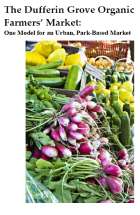
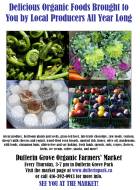

 Printer friendly version
Printer friendly version

